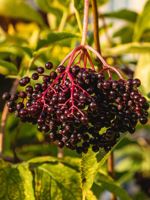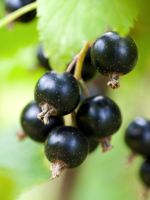Mon-Fri 9am - 5pm Mountain time
Bob Gordon Elderberry vs Ben Sarek Black Currant
Sambucus canadensis Bob Gordon
Ribes nigrum Ben Sarek
NOT AVAILABLE THIS SEASON - MIGHT RETURN
Bob Gordon Elderberry is a Black Elderberry cultivar that produces berries that are larger and sweeter than other varieties, making it one of the top cultivars. It produces large clusters of white flowers that turn into large clusters of dark purple to black berries. The berries are well-suited for baked goods, jams, jellies, and syrups. It was selected from the wild in Missouri.
The large berry clusters that the Bob Gordon Elderberry produces will often end up hanging downward. This makes it more difficult for birds to feed on the berries. If birds are a concern, this might be the right berry for you.
Black Elderberries are considered to be partially self-pollinating. So while they will still produce some berries without cross-pollination, planting with another variety will increase yields. Consider planting with Black Elderberry or Ranch Elderberry.
Warning: the seeds, stems, leaves, roots, and uncooked berries are toxic to humans when eaten in quantity. Berries should be cooked to make them safe for human consumption.
Ben Sarek Black Currant is a compact, high-yielding Black Currant cultivar, making it ideal for smaller gardens and easy berry picking. The large clusters of flavourful, sweet-tart berries ripen in mid-summer and are perfect for fresh eating, preserves, baked goods, and liqueurs. Plants may start producing some berries after two years, reaching full production in about four to five.
Developed by the Scottish Crop Research Institute, Ben Sarek Black Currant is resistant to powdery mildew and moderately resistant to white pine blister rust. It is self-fertile, meaning it does not require cross-pollination from another variety to produce fruit.
Bob Gordon Elderberry Quick Facts
Ben Sarek Black Currant Quick Facts
Toxicity: leaves, stems, and uncooked berries are poisonous to humans

